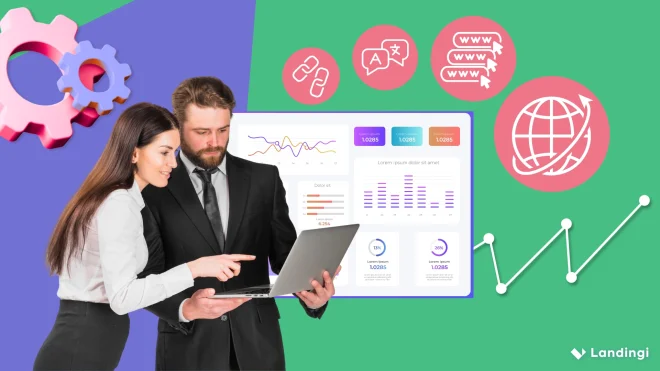Enterprise SEO is basically SEO, but for large-scale websites with thousands of pages, global audiences, and complex site structures. Therefore, unlike traditional SEO, it requires a strategic and technical approach tailored to the needs of high-traffic domains, advanced infrastructures, and multi-department operations.
Enterprise SEO optimization is crucial because it helps large organizations maintain visibility, reduce customer acquisition costs, and drive sustained growth through organic search. According to BrightEdge Research, organic search accounts for 53.3% of total website traffic, making SEO the most cost-effective channel for long-term performance.
To succeed, businesses need a clear enterprise SEO strategy, automation through advanced enterprise SEO software, and a commitment to applying scalable, consistent enterprise SEO best practices. This article explains it all to help you implement effective enterprise SEO optimization, improve search visibility, and drive long-term results with data-backed decisions.

What Is Enterprise SEO?
Enterprise SEO is about managing and optimizing search engine presence for large–scale websites, leading to improved organic traffic. This strategy focuses on scalability, automation, and management across complex content ecosystems.
Enterprise SEO is essential for companies with:
- websites with over 10,000 indexed pages,
- multiple subdomains or international domains,
- numerous brand entities or departments contributing content,
- high volumes of programmatic content, like e-commerce catalogs or media archives.
The ultimate aim of enterprise search engine optimization (SEO) is to consistently enhance organic visibility and dominate relevant search engine results pages for many keywords.
Why Is SEO for Enterprise Important?
SEO for enterprise is important because it increases visibility, decreases costs, ensures technical performance, and protects brand integrity, making it critical for large-scale digital operations. Since large enterprise organizations manage websites with thousands of URLs, complex technical infrastructures, and diverse content contributors, without an enterprise-level SEO strategy, these assets fail to rank efficiently, reducing reach and increasing acquisition costs.
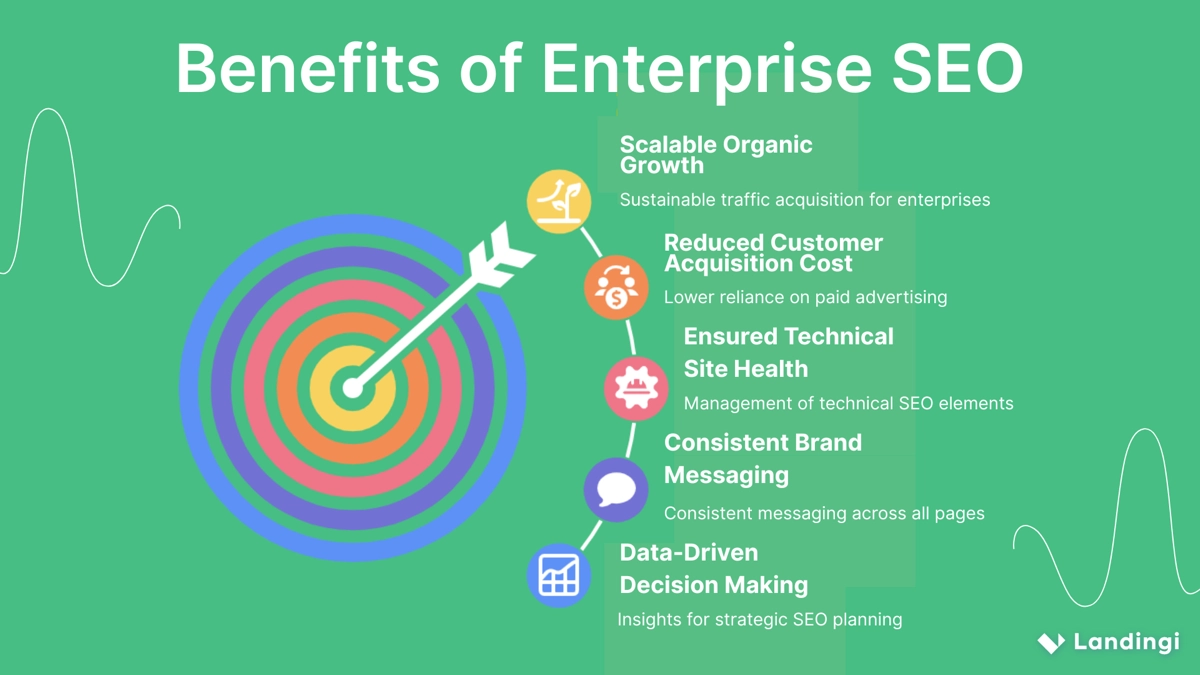
The main benefits of enterprise SEO involve:
Scalable Organic Growth
Enterprise SEO enables sustainable, non–paid traffic acquisition, which means it helps big websites grow their traffic naturally, without paying for every click. It lets you reach more people across many pages, products, or locations by making your content easier to find in search results.
Reduced Customer Acquisition Costs
SEO reduces reliance on paid advertising in two ways. First, you attract traffic through high-ranking pages that keep performing over time, which helps reduce your overall marketing spend while bringing in steady leads. Second, the fact is that well-optimized pages achieve higher CTR, which is often an indicator when calculating PPC costs – you pay less for each click when your pages have a higher CTR.
Ensured Technical Site Health
SEO audits help detect and prevent indexing issues, slow load times, broken links, and duplicate content – all of which harm rankings. However, managing this complexity at scale requires a dedicated approach to technical SEO management, which operates across many platforms, templates, and deployments at the enterprise level.
Consistent Brand Messaging and Legal Compliance
Enterprise SEO guarantees message consistency and legal compliance across departments and content types. Whether in multiple languages, markets, or domains, SEO ensures that the correct version of content ranks and aligns with brand guidelines.
Data-Driven Decision Making
The last but most important for enterprises is data-driven decision making. Enterprise SEO tools provide detailed performance insights across thousands of pages, as well as what users search for and where growth opportunities are. It supports prioritization, ROI measurement, and predictive forecasting across regions or product lines, ultimately letting teams make smarter, faster decisions based on real data, not guesswork.
Scale your SEO strategy and capture more leads with Landingi’s powerful landing pages.
What Is the Difference Between Enterprise SEO and Regular SEO?
The main difference between enterprise SEO and traditional SEO lies in scale and complexity. While traditional SEO focuses on optimizing smaller websites, enterprise-level SEO manages large sites with thousands of pages, often across multiple domains and teams. It requires advanced tools, automation, and cross-department collaboration.
Enterprise SEO also includes more structured processes, like technical audits, global SEO strategies, and performance reporting at scale. It supports big brands that need consistent visibility, fast issue resolution, and smart use of data across many channels. Simply put, it’s SEO – but built to handle much bigger challenges.
What To Look For in an Enterprise SEO Solution?
When choosing an enterprise SEO solution, focus on tools that support scale, automation, and collaboration. It’s also essential to consider ongoing support, as large organizations often face unique challenges. The criteria and features to evaluate in choosing the right platform involve:
1. Scalability and Performance
The platform must effectively manage large, complex websites with thousands or even millions of pages. It should handle high traffic and frequent updates. Another factor involves the platform’s automation capabilities, crucial for managing repetitive tasks at scale, such as optimizing content, conducting technical audits, and generating reports.
2. Advanced Technology and AI
Focus on platforms that incorporate the latest technology, like AI and machine learning, to simplify keyword research, improve content optimization, and analyze competitors thoroughly. Tools that use predictive analytics and automate compliance checks can give you a strong edge, helping you keep up with SEO trends and manage risks effectively.
3. Comprehensive Technical SEO Tools
The platform should provide strong technical SEO capabilities, including site audits, optimization of crawl budgets, detection of duplicate content, XML sitemaps management, and schema markup implementation. Ongoing monitoring and automated alerts for issues (such as broken links, crawl errors, and site speed concerns) are crucial to ensure the overall health of the site.
4. Content Optimization and Strategy
While integrated tools for keyword research, content gap analysis, and content optimization are necessary, the platform dedicated to enterprise SEO should also support large-scale content strategies, like localization and adaptation for different regions. Other valuable features involve search intent analysis and content improvement recommendations.
5. Workflow, Collaboration, and Project Management
Enterprise SEO success hinges on cross-departmental teamwork (marketing, IT, content, legal, etc.), so prioritize solutions with workflow, task, and communication features. Standardized workflows help ensure consistency and compliance across teams.
6. Integration Capabilities
If it doesn’t integrate seamlessly with your existing business tools (e.g., CMS, analytics platforms, CRM), your enterprise SEO platform could become more trouble than it’s worth. Such integrations enable unified, automated data analysis and reporting, which is crucial for your efficiency in SEO efforts.
7. Reporting and Analytics
Even though it seems obvious, check if the solution includes advanced analytics and customizable reporting features. These are crucial for tracking performance across multiple domains, business units, and locations. Additionally, customizable reporting features are equally vital, allowing you to tailor dashboards and reports to the specific needs and KPIs of different stakeholders within your organization.
8. Security, Compliance, and Risk Management
In enterprise SEO, data privacy and operational resilience are crucial. Solutions should ensure compliance with regulations like GDPR and CCPA, offering tools for data and consent management. Additionally, platforms must help manage risks from search engine algorithm updates and technical failures, with features for monitoring changes and making necessary adjustments. Regular security audits are vital to identify vulnerabilities, and comprehensive recovery plans are essential for business continuity during disruptions. Together, these measures foster a secure and reliable enterprise SEO strategy.
9. Customization and Flexibility
Prioritize a platform that can be adapted to your organization’s exact requirements with custom workflows, dashboards, and connections. Look for modular upgrades and flexible pricing so the SEO solution can scale as your organization evolves.
10. Support and Rate of Innovation
Determine the vendor’s investment in ongoing development, the strength of their support infrastructure, and their commitment to innovation. Reliable expert support, training materials, and a quick-responding customer service are vital for sustained success.
How to Create an Enterprise SEO Strategy?
Creating an enterprise SEO strategy starts with comprehensive research, followed by a full technical SEO audit and thoughtful goal setting. Then, it’s essential to focus on a scalable keyword strategy, build a content hub and topic clusters, automate and standardize processes, ensure technical SEO infrastructure, and build authority. A winning enterprise SEO strategy is structured, data-driven, and repeatable – built to handle scale, change, and business impact. Therefore, to create your enterprise SEO strategy, follow the step-by-step guide below and remember the advice:
- When dealing with SEO for complex websites, it’s all about having strategies that can scale and implement without a hitch to keep optimization and performance on track.
- Enterprise SEO heavily relies on advanced analytics and data insights to spot trends, track results, and guide strategic changes.
- Successful enterprise SEO necessitates teamwork among marketing, IT, and content departments to unify objectives and simplify execution.
Enterprise SEO success starts with pages that perform—build them fast with Landingi.
Step 1: Base Your Strategy on Data and Industry Benchmarks
The best start for creating an SEO strategy for enterprise websites is to gather extensive data across your digital ecosystem. Perform in-depth competitor research to dissect their keyword strategies, content formats, and technical SEO foundations that fuel their online visibility.
Simultaneously, analyze your diverse market segments to gain a profound understanding of search demand, nuanced audience intent behind queries, and any existing content gaps you can fill. Establish clear and measurable benchmarks by leveraging reputable industry data sources to objectively assess your current standing within the competitive enterprise environment.
Connect your analytical insights directly to your product’s main marketing plan. Also, keep in mind the limits of your available budget. Use the insights you’ve gained to build a strong business case for your SEO strategy – make sure it shows clear potential, explains the expected benefits, and supports your organization’s main goals.
Step 2: Conduct Technical SEO Audit
The second step involves performing a thorough technical audit. Use tools like Screaming Frog, Ahrefs, or Semrush to scan your entire site for issues that may block search engine access or harm rankings. Focus on:
- crawlability,
- indexing,
- site speed,
- mobile-friendliness,
- duplicate content
- URL structures,
- redirects,
- internal linking,
- and structured data implementation.
In large-scale sites, even minor technical flaws can cascade, affecting the performance of countless pages. However, a meticulously documented audit provides the clarity needed to prioritize necessary fixes based on their potential impact and urgency.
Building on this understanding of your own site’s health, pair these findings with insights from your competitive analysis. This comparative view can pinpoint specific areas where technical gaps may cost you visibility. A clean technical foundation ensures that all future content and SEO efforts are fully supported.
Step 3: Align Content Strategy with Your Business Goals
Next, it’s crucial to consider your core business goals and ensure your content strategy directly supports them. Identify key products, services, or market segments that drive revenue. Then, plan relevant content around these priorities and ensure it addresses user intent, providing value at every stage of the customer journey.
How to do it? Organize your content by business units or funnels, such as awareness, consideration, and conversion, so that each piece of content has a clear purpose. By structuring it this way, you ensure that your SEO initiatives lead to measurable results, such as generating leads, encouraging product adoption, and improving customer retention.
Step 4: Focus on Scalable Keyword Strategy
The fourth phase, developing a scalable keyword strategy, is crucial for maintaining search visibility across thousands of pages. Use advanced tools to identify a broad and deep set of keywords relevant to your industry, including long-tail and high-competition terms.
For enterprise websites, scalability matters – your strategy must cover global markets, multiple languages, and varied customer journeys. It’s about constantly growing and tweaking your keyword list to grab new chances and fill any gaps in your content. Working closely with your content teams is key too, making sure those keywords are naturally integrated into page copy, headings, and metadata. A structured, scalable approach allows your site to grow while keeping search performance aligned with business priorities.
Step 5: Build a Content Hub and Topic Clusters
Next, to improve topical relevance and internal linking, create a central content hub supported by topic clusters. Identify key themes that reflect your main business offerings, then develop pillar pages with supporting articles that dive into subtopics. Link these pages strategically to guide both users and search engines.
This structure makes your site easier to crawl and helps boost rankings for high-value keywords. For large-scale sites, this approach is crucial, as it improves both content depth and discoverability. Aligning with proven SEO practices, content hubs help establish authority while keeping your site organized and responsive to user intent.
Step 6: Automate and Standardize Processes
To scale effectively, enterprise SEO requires automation and consistent workflows. Use automation and AI tools for tasks like technical audits, rank tracking, internal linking suggestions, and schema deployment. Then, standardize how content is created, optimized, and published across all departments to ensure quality and speed.
Create SEO guidelines, templates, and checklists for developers, designers, and writers. Centralize documentation and make processes repeatable to reduce errors and training time. Automation not only saves resources but also ensures every part of your SEO operation runs smoothly, regardless of site size or team structure.
Step 7: Optimize for Technical Excellence and User Experience
Next, focus on user experience – at the enterprise level, SEO success depends on both strong technical foundations and seamless UX. To improve your website, ensure fast load times, mobile responsiveness, clean site architecture, and efficient crawl paths. Implement structured data and use hreflang tags correctly for international sites. Regularly check for technical issues, such as broken links, duplicate content, and low scores in Core Web Vitals.
Also, focus on making your site easy to navigate, with clear calls-to-action and an accessible design. When a site is user-friendly and operates smoothly, it not only retains visitors but also enables search engines to access and interpret its information efficiently. Therefore, this approach improves your rankings, boosts conversions, and ensures long-term SEO stability for your digital properties.
Track user interactions across your pages and improve them through the power of data-driven optimization!
Step 8: Focus on Building Authority
Lastly, to rank consistently, enterprise websites must earn and maintain topical and domain authority. Producing high-quality, accurate content that addresses user needs in-depth and supporting this with credible internal linking and regular updates is a good start, but it’s not enough to ensure SEO success for enterprise-level websites.
The solution lies in securing authoritative backlinks from trusted industry sources, partners, and media. Use thought leadership, data studies, and expert commentary to position your brand as a reliable source. Authority signals – like citations, mentions, and external links – help search engines trust your content, which directly impacts visibility and keyword rankings across your entire site.
Additional Advice:
Beyond the key steps listed above, you should also foster cross-functional collaboration across marketing, product, IT, and compliance teams to ensure SEO is integrated into the organization’s culture and workflows. At this point, standardized processes truly matter – especially when working with external partners or agencies.
Remember, enterprise SEO is an ongoing process, and success depends on constant measurement, transparent reporting, and agile improvements that align with business goals – use dashboards and analytics tools to monitor trends across pages and markets and generate regular reports for stakeholders, highlighting wins, losses, and next steps. The key is to learn from successes and failures, all to continuously improve your strategy.
4 Proven Enterprise SEO Best Practices
Now, as you know the foundations of effective enterprise SEO strategies, it’s time to dive into nuances – the 4 proven best practices that can elevate your strategy involve:
- Targeting featured snippets,
- Optimizing for voice search,
- Focusing on local and international optimization,
- Preparing for Google’s Search Generative Experience (SGE).
Although the three core pillars of enterprise SEO strategy – content, link building, and technical SEO – are always fundamental, incorporating these cutting-edge tactics will ensure your enterprise remains at the forefront of search visibility.
1. Target Featured Snippets
Featured snippets are brief summaries that provide answers to a user’s query, prominently displayed at the top of Google’s search results page. For enterprise SEO, securing these sought-after positions is crucial, as they deliver unmatched visibility – often placed above traditional organic search results and even paid advertisements. Winning a featured snippet for even a small number of relevant queries can lead to significant increases in visibility and authority for different business units and product lines.
To target featured snippets, focus on identifying common questions your target audience asks and then providing clear, concise, and direct answers within your content. This often involves structuring content with distinct headings for questions, followed immediately by short, paragraph-style answers (under 50 words), or using bulleted/numbered lists and tables.
How to do it:
Ensure your content directly addresses the user’s intent, uses the exact or closely related phrasing of common questions, and leverages schema markup where appropriate to help Google understand the nature of your content. Additionally, make it a habit to consistently review your keyword research, focusing on question-based queries and take the time to analyze competitor content that successfully captures snippets. This will help you reverse-engineer effective formats.
2. Optimize for Voice Search
Voice search optimization involves adapting your content and website to rank effectively for queries spoken into voice assistants like Google Assistant or Siri. For enterprise SEO, this is increasingly critical due to the rising adoption of smart speakers and mobile voice search. Voice queries are fundamentally different from text-based searches – they are more conversational, often longer (long-tail keywords), and may have local intent (“near me”).
For large enterprises, securing favorable voice search results means providing users with direct answers, enhancing brand recognition through personalized interactions, and gaining a competitive advantage in an ever-changing search environment.
How to do it:
Optimizing for voice search largely overlaps with good overall SEO practices but with a specific conversational focus. Prioritize creating content that directly answers common questions in a natural, spoken language. Utilize long-tail, question-based keywords (e.g., “how to,” “what is the best,” “where can I find”) that mimic real-life conversations. Remember to structure your content with clear headings and concise answers, often in FAQ sections, to make it easy for voice assistants to extract information.
You should also ensure your Google Business Profile (for local businesses) is updated and complete, as many voice queries have local intent. Finally, maintain excellent site speed and mobile-friendliness, as most voice searches originate from mobile devices.
3. Focus on Local and International Optimization
Local optimization focuses on improving visibility for geographically-specific searches, ensuring your business appears prominently when users search for products or services “near me” or in a particular city/region. International optimization, conversely, involves tailoring your website’s presence for different countries and languages, considering cultural nuances and distinct search engine preferences in those regions.
For enterprise SEO, both are critical. If your organization has multiple physical locations (retail stores, branches, offices) across various cities, states, or even continents, neglecting local SEO means missing out on immediate, high-intent traffic from nearby customers. Failing at international SEO means a significant loss of market share and brand visibility in crucial global markets.
How to do it:
To optimize your local presence, manage your Google Business Profile (GBP) listings carefully for each location. Make sure your Name, Address, and Phone (NAP) information is consistent across all online directories. Encourage customers to leave reviews and make sure to respond to them. Also, translate successful content and create landing pages that are relevant to your local audience.
For international optimization, implement proper Hreflang tags to signal language and geographical targeting to search engines, create country–specific or language–specific versions of your website (e.g., using subdomains, subdirectories, or separate domains), and localize content for cultural relevance. Be aware of local search engines, like Baidu in China and Yandex in Russia, and adjust your keywords to match regional differences. Additionally, factors like the location of your server and using a content delivery network (CDN) can help improve your global reach.
Turn massive traffic into measurable results! Start creating multi-language pages with Landingi now.
4. Prepare for Google’s AI Overviews (AIO)
Google’s AI Overviews (AIO) is an experimental integration of generative AI directly into the search results page. Instead of just listing links, AIO provides AI-powered “overviews” that summarize information from multiple sources to answer complex queries directly, often at the very top of the SERP.
For enterprise SEO, AIO marks a major shift. Although traditional organic links may still exist, AI-generated summaries could decrease direct clicks, particularly for informational queries where users find answers in the overview. This requires enterprises to adapt their content strategies to ensure their information is prioritized for these summaries. Staying ahead of AIO optimization is crucial for maintaining brand authority and visibility in the changing search landscape.
How to do it:
Preparing for AIO involves a renewed focus on creating exceptionally high–quality, comprehensive, and authoritative content that deeply addresses user intent. Look beyond just simple keywords and aim to address complex, multi-layered questions in a thorough and concise manner. Highlight the principles of E-E-A-T (Experience, Expertise, Authoritativeness, Trustworthiness) by ensuring that your content is accurate, well-researched, and supported by credible sources.
At this point, content structure, again, matters most. AI models extract information easily when your content is structured logically with clear headings, bullet points, and summaries. Don’t forget about technical SEO – site speed and user experience are foundational elements that continue to be crucial for Google to crawl, understand, and trust your content as a reliable source for AIO.
How to Create an Enterprise SEO Audit?
To create an effective enterprise SEO audit, choose an approach that systematically evaluates every facet of your large–scale online presence – it‘s about broken links, technical infrastructure, content performance, competitive standing, and overall strategic alignment. A comprehensive enterprise audit lets you uncover hidden opportunities, identify critical roadblocks, and lay the groundwork for scalable improvements that drive significant organic growth.
Once you select your SEO tool for audit, follow this checklist to ensure you evaluate each core website element:
- Analyze current keyword rankings and identify competitors dominating key terms.
- Evaluate content topics to confirm relevance, clarity, and completeness.
- Eliminate duplicate content to prevent ranking conflicts and indexing issues.
- Verify that URL structures accurately reflect the page’s purpose and hierarchy.
- Check that titles, meta descriptions, and headings align with search intent.
- Refresh and submit an up-to-date XML sitemap via your SEO platform.
- Audit indexed pages to ensure search engines include all critical content.
- Map and clean internal, external, and backlink structures for efficiency.
- Confirm that your site design and functionality are fully mobile-responsive.
- Measure page load times and fix delays affecting user experience.
- Optimize or replace outdated images with compressed, descriptive files.
How Much Does Enterprise SEO Cost?
The average monthly cost for enterprise SEO for most businesses in 2025 falls between $500 and $7,500, according to the latest WebFX research. However, the final price depends on the scale of your website, the complexity of technical needs, and the size of your content footprint. For more extensive enterprise SEO needs, think large brands, companies with many locations, or those in very competitive sectors, the investment is typically much greater. Comprehensive strategies covering advanced content, technical SEO, and link–building initiatives often cost $25,000 to $50,000 or even more per month.
Larger businesses often work with enterprise SEO teams or agencies that offer specialized services like site architecture optimization, international targeting, and content scaling. These services demand more time and advanced tools, which raises the investment required.
Pricing also reflects the use of enterprise SEO platforms such as Ahrefs or BrightEdge, which offer automation, analytics, and collaboration features not available in basic tools. These platforms streamline SEO tasks like keyword mapping, internal linking, and technical audits, so they are often a necessity for effective enterprise SEO.
Although in-house models may seem cost-effective, they still require significant budgeting for salaries, tools, and training. Outsourcing may reduce overhead while increasing flexibility and speed of execution for critical SEO efforts.
Take a look at the table below to understand how enterprise SEO differs from traditional SEO services, along with the factors that affect its cost:
| Feature | Traditional SEO | Enterprise SEO |
|---|---|---|
| Average Monthly SEO Cost | $500 – $2,000 | $500 – $7,500+ |
| Website Size | <1,000 pages | 10,000+ pages |
| SEO Tools | Basic | Enterprise-grade platforms |
| Team Involvement | 1–2 specialists | Cross-functional teams |
| Scope of SEO Tasks | Limited | Technical + Content + Global |
| Reporting & Integrations | Basic GA integration | Custom dashboards, APIs |
| Support for Multiple Regions | Rare | Standard |
What Is the Best Enterprise SEO Tool?
The best enterprise SEO tool in 2025 is widely recognized as Semrush Enterprise, particularly for organizations in need of advanced customization, automation, and scalability. What sets Semrush Enterprise apart is its capability to manage the SEO performance of thousands, or even millions, of webpages. It offers a suite of powerful features, including AI-driven workflow automation, data-based performance forecasting, extensive content optimization, and highly customizable reporting options. Renowned global brands turn to Semrush Enterprise to enhance their SEO strategies and quickly obtain actionable insights that benefit teams across different regions.
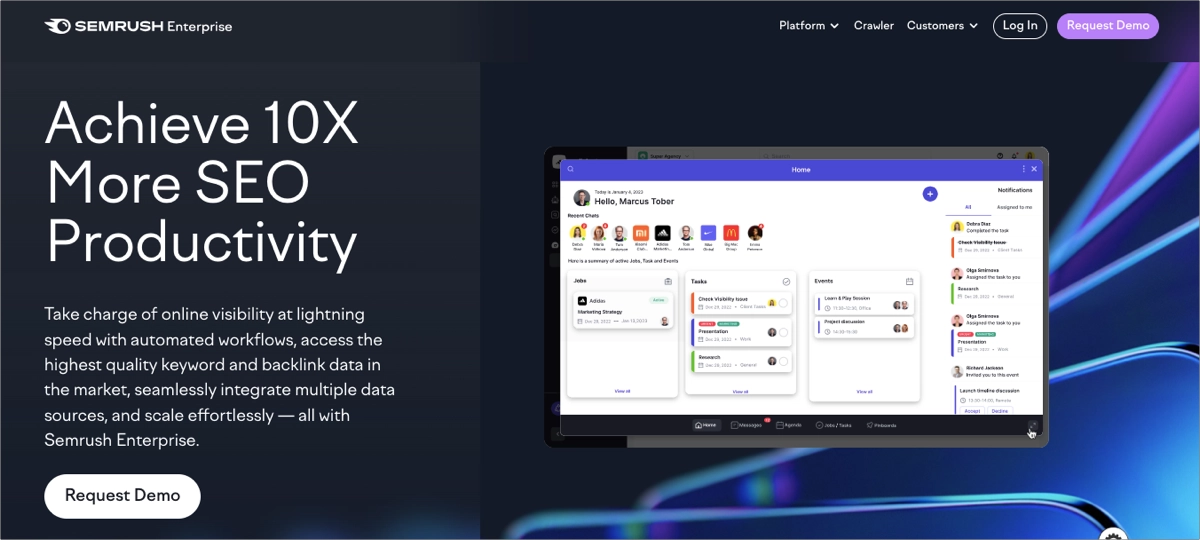
Other leading contenders in the enterprise SEO arena include Ahrefs Enterprise, BrightEdge, Conductor, and Botify. Each of these enterprise SEO platforms offers much more than basic SEO functionalities. They provide AI-powered insights, automation, extensive technical audits, and seamless integrations with analytics and business intelligence tools – all crucial for enterprise SEO teams managing intricate digital environments.
Ahrefs Enterprise
Ahrefs itself is a popular and widely appreciated SEO platform, but its enterprise version is renowned for in-depth backlink and keyword analysis, competitor research, and large-scale technical audits. Ahrefs is a preferred choice for enterprises facing complex SEO challenges across multiple domains. Its advanced dashboards, historical data, and API access make it particularly valuable.
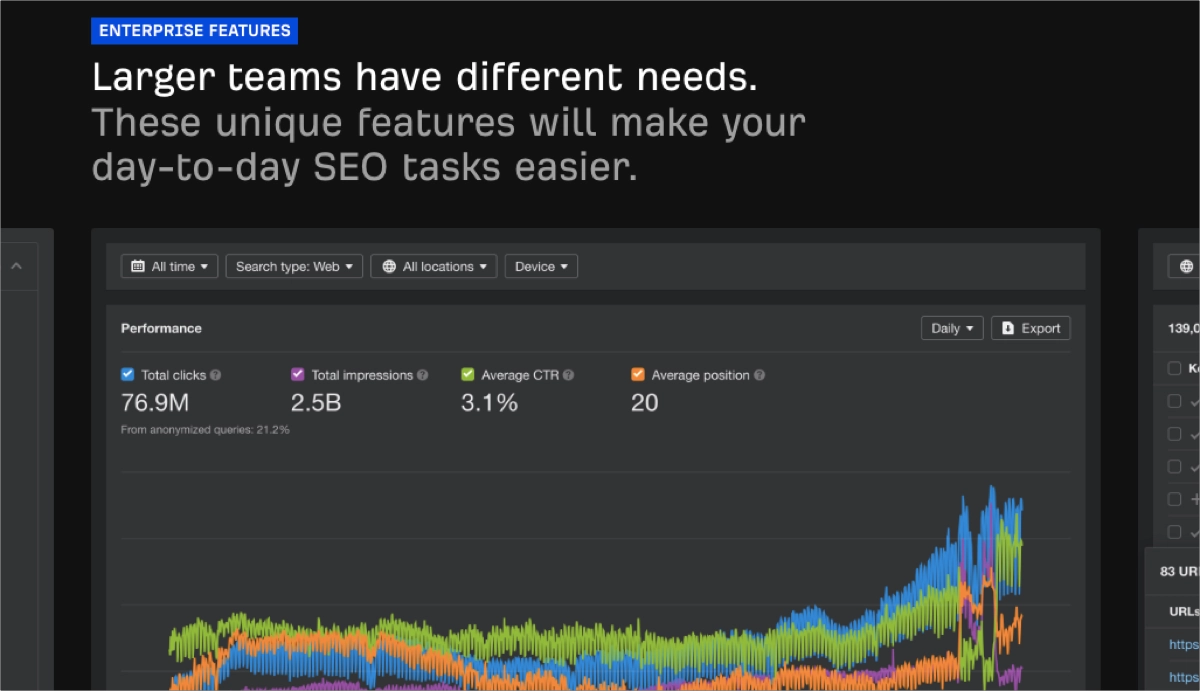
BrightEdge
BrightEdge is an SEO platform that stands out with its real-time AI recommendations, keyword intelligence, and ROI tracking, making it the best tool for optimizing marketing efforts. BrightEdge is truly beneficial for global brands that prioritize content performance and require detailed reporting for executive-level insights.
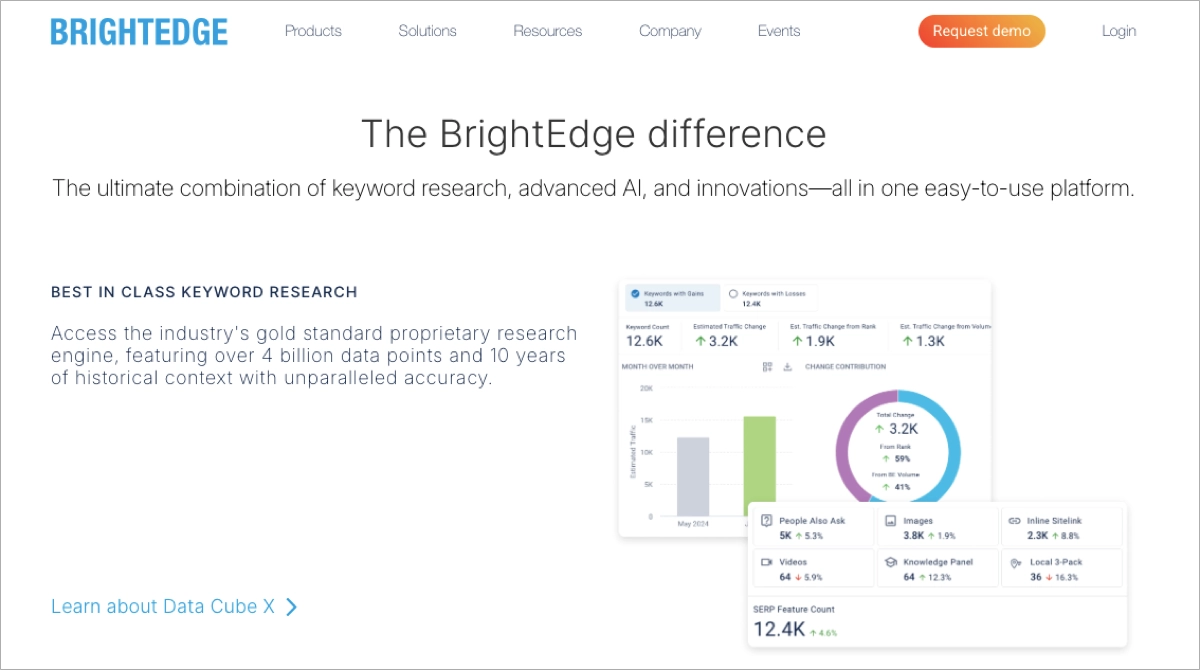
Conductor
Conductor specializes in content-driven SEO and audience insights, making it ideal for teams that emphasize linking SEO efforts to business outcomes and enhancing collaboration across different departments.
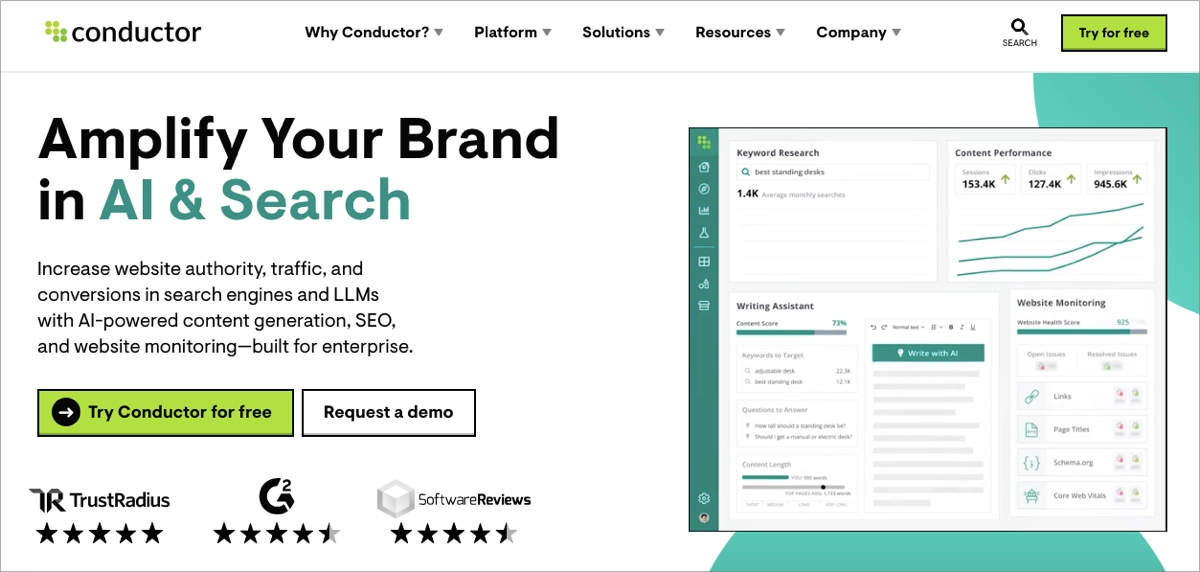
Botify
Botify is another great SEO solution for enterprise businesses that excels at technical SEO automation. It helps in optimizing large and complex sites for AI-driven search, and its advanced crawling and alerting capabilities set it apart in the market.
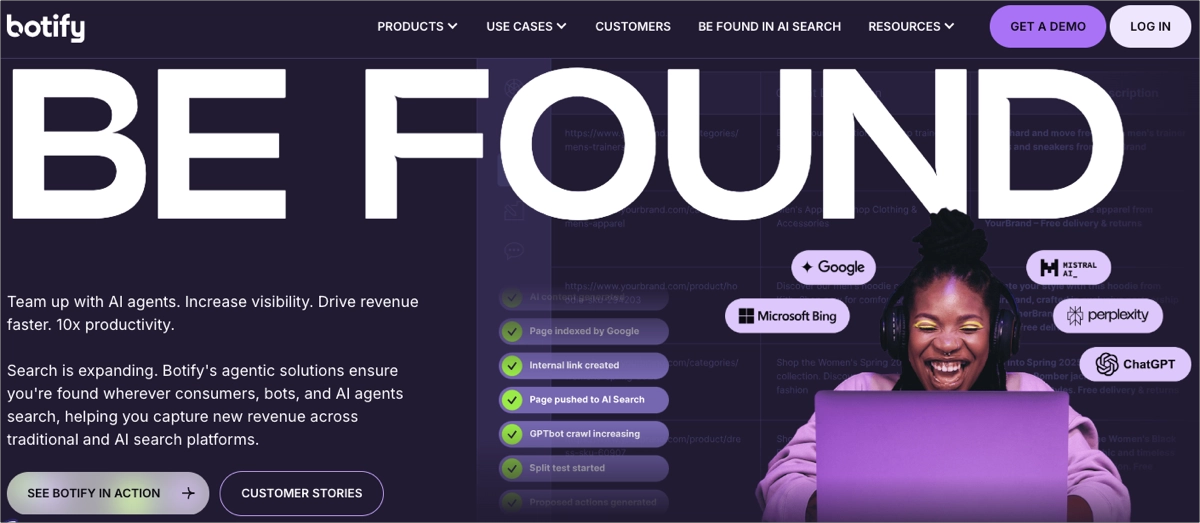
Check out the table below to discover how these tools differ and choose the best option for your search engine optimization efforts:
| Feature | Semrush Enterprise | Ahrefs Enterprise | BrightEdge | Conductor | Botify |
|---|---|---|---|---|---|
| Best For | All-in-one SEO & PPC insights | Backlink & competitive analysis | Content performan-ce & automation | Content strategy & collabora-tion | Technical SEO & site crawling |
| Keyword Tracking | ✓ Extensive tracking across regions | ✓ Accurate & deep keyword data | ✓Integrated with content tools | ✓ Audience + keyword integration | ✓ Basic keyword monitoring |
| Backlink Analysis | ✓ Advanced link database | ✓ Market-leading link index | ✓ With content relevance scoring | ✓ With influence mapping | ✓ Focused on crawl impact |
| Site Audit Tools | ✓Comprehensive and visual | ✓ Clear, detailed reports | ✓Integrated with content health | ✓ Supports team workflows | ✓ Full log analysis + JS crawl |
| Content Tools | ✓ SEO writing assistant, templates | ✕ (Limited content tools) | ✓ Content scoring + insights | ✓ Content briefs & page insights | ✕ (Primarily technical focus) |
| User Collabora-tion | ✓ Multi-user & reports | ✕ (Single-user focused) | ✓ Workflow + task automation | ✓ Team-based setup + roles | ✓ Tag-based task mana-gement |
| Internatio-nal SEO | ✓ Supports multi-region | ✓ Multi-language tracking | ✓ Hreflang + geo dashboards | ✓ Built-in localization tools | ✓Internatio-nal crawl analysis |
| Integrations | Google Tools, HubSpot, CRM | Google Tools only | Adobe Analytics, Salesforce | Google Analytics, BI tools | Adobe, GA, CMS platforms |
What’s the Use of Landing Pages in Enterprise SEO?
Landing pages help enterprise companies target specific keywords, user intents, and market segments with tailored content. By closely aligning with users’ search queries, these pages enhance search engine visibility and improve relevance, leading to higher ranking potential. Additionally, well-optimized landing pages attract organic search traffic by transforming high-volume queries into opportunities for conversions, lead generation, or product exploration.
How can you make these pages work hard for you? Landing page SEO involves crafting clear, keyword-rich content, optimizing title tags, meta descriptions, and headings, improving the page’s load speed, and strategically adding internal links. Ultimately, the goal is straightforward: increase visibility, attract qualified traffic, and drive more conversions directly from organic search.
Therefore, to achieve the most, it’s crucial to select the right landing page platform, such as Landingi, that supports the sophisticated needs of enterprise SEO, offering robust A/B testing, detailed built-in analytics, seamless integrations with external tools, and scalability to manage a high volume of diverse landing pages across your entire digital ecosystem.

Landingi streamlines creating landing pages at scale, offering the Programmatic Page tool, Smart Sections, and AI landing page features – among these, you’ll also find an SEO copy generation tool that automatically aligns titles and descriptions to the page’s copy. Moreover, Landingi supports creating multi-language landing pages and offers automatic mobile optimization, streamlining your ability to target diverse audiences and ensuring optimal performance across all devices.
Enterprise-ready. Conversion-focused. Launch your next SEO-driven campaign with Landingi.
Where to Find an Enterprise SEO Expert?
You can find an enterprise SEO expert through specialized SEO agencies, independent consultants, freelance platforms, professional networks, and referrals. Agencies often have dedicated enterprise divisions with teams of experts focused on the unique challenges and opportunities of large businesses. Look for those with a proven track record of working with companies similar to yours in terms of size, industry, and complexity.
However, highly experienced individual consultants can offer a more personalized approach. Many come from agency backgrounds or have held in-house SEO leadership roles at large organizations, showcasing proven experience in the SEO industry. They understand large-scale SEO processes well, often providing strategic guidance, audit services, and can help build or train in-house teams. While perhaps not ideal for a full-scale, ongoing enterprise SEO strategy, platforms like Upwork, Fiverr Pro, or Toptal can be useful for finding specialized freelancers for specific, well-defined tasks within a larger enterprise SEO project.
Additionally, word-of-mouth remains one of the most reliable methods. Ask trusted peers, industry contacts, or even non-competing businesses within your network if they can recommend an enterprise SEO expert or agency they’ve had success with.
When hiring an enterprise SEO expert, consider the following steps:
- Outline your specific business objectives and the exact SEO tasks you need help with.
- Screen agencies or individual experts for their relevant enterprise experience, look for strong case studies, and confirm their technical skills.
- Interview your top choices to gauge their strategic thinking and see if they’re a good fit for your team’s culture.
- Set clear expectations and make sure everyone agrees on what will be delivered, project timelines, and how performance will be reported.
Ultimately, whether you choose an agency, consultant, or freelancer, ensure your enterprise SEO expert has a proven track record managing large-scale SEO efforts and can adapt strategies as your business grows.
What Are the Common Enterprise SEO Issues?
Common enterprise SEO issues involve duplicate content across web pages, poor crawlability and indexing, inconsistent technical standards, slow page load times, and weak internal linking structure. Beyond these, enterprises frequently face scaling challenges as their websites grow, and a significant hurdle is often a lack of effective coordination across different teams.
Large enterprise websites often struggle with having thousands of very similar or even duplicated pages, especially in online stores or sites with many regional versions. This can really throw search engines off and weaken your rankings. On top of that, if the site structure is too complicated or resources are blocked, search engines might not be able to fully reach and index important pages, which in turn negatively affects visibility. And without someone keeping a central eye on things, different teams might end up doing SEO their own way, leading to issues like broken redirects, missing tags, or conflicting metadata.
Heavy scripts, unoptimized images, and bloated code can seriously drag down your site’s performance, negatively affecting both the user experience and search engine ranking. Likewise, if your internal linking isn’t efficient or consistent, it makes it harder for crawlers to navigate and lowers the authority passed between key pages.
Where Can I Get an Enterprise SEO Certificate?
You can obtain an enterprise SEO certificate from several reputable platforms (such as Semrush, HubSpot, or Coursera), offering comprehensive SEO training and certification programs tailored to different levels of expertise, including enterprise SEO concepts. For instance, Semrush Academy offers a wide range of free SEO courses, including advanced training on SEO strategy, technical SEO, content-led SEO, and local SEO.
HubSpot offers a free SEO Certification Course that’s perfect for marketers and teams aiming to build a solid, comprehensive SEO strategy. It covers all the basics like keyword research, link building, technical and on-page SEO, and even how to report on your SEO efforts. Beyond that, Coursera also has a variety of SEO courses available – these often come with certificates upon completion and delve into topics highly relevant to enterprise SEO, such as optimizing large-scale website content and tackling complex technical SEO challenges.
HubSpot’s SEO Certification Course is free and covers fundamentals such as keyword research, link building, technical and on-page SEO, and SEO reporting. It is well-suited for marketers and teams looking to build a comprehensive SEO strategy. Coursera also offers SEO courses, providing certificates upon completion and covering topics relevant to enterprise SEO, such as optimizing website content and technical SEO.
Additionally, for those seeking to gain advanced enterprise SEO skills, you can explore Moz Academy. They offer paid courses with certifications that delve deeply into crucial areas like technical SEO, local SEO, intricate keyword research, and comprehensive competitive analysis. These programs are particularly well-suited for professionals looking to master the more complex aspects of enterprise-level search optimization.
What Are the Limitations of Enterprise SEO?
The limitations of enterprise SEO are notable and include slow implementation, complex site structures, limited flexibility, tool and platform dependency, fragmented teams, and the challenge of scaling content without quality loss. Each of these presents distinct hurdles. For instance, slow implementation is common, as changes often require approvals from multiple departments, like IT, legal, and product teams, which inevitably slows down execution and reduces agility.
Furthermore, the complex site structures inherent to large enterprise websites, potentially including thousands of pages, numerous subdomains, and multiple languages, make even routine SEO fixes considerably harder to coordinate and monitor effectively. There’s also limited flexibility at times, as strict brand guidelines and content rules can restrict crucial on-page SEO optimizations.
Tool and platform dependencies are key in enterprise SEO, often requiring expensive technology that, without proper setup and training, may be underused or misconfigured. Fragmented teams further complicate efforts as SEO responsibilities spread across departments, leading to duplicated work and conflicting priorities. A major challenge is scaling content withoutquality loss, meaning producing the high volumes of optimized content necessary for enterprise scale while simultaneously maintaining consistency and depth across multiple markets and regions.
Boost Traffic and Leads with Enerprise SEO
Enterprise SEO isn’t just another item on your marketing checklist – it’s a fundamental pillar for scalable organic growth, amplified site performance, and driving genuinely qualified traffic across today’s expansive digital ecosystems. When armed with the right enterprise SEO strategy, companies can precisely align their search visibility with overarching business goals, unlocking substantial long-term value that resonates across the entire organization.
The journey is undoubtedly complex, but it’s made significantly more manageable with the right tools and approach. Leveraging cutting-edge enterprise SEO software can automate intricate tasks, provide continuous performance monitoring, and foster seamless collaboration among diverse teams. By diligently applying proven enterprise SEO best practices – from content clustering to technical audits –you ensure both consistency and effectiveness at a scale.
Ultimately, the numbers speak for themselves. According to recent enterprise SEO statistics from SeoProfy, 70% of marketers confirm that SEO generates more sales than PPC, and B2B companies generate twice as much revenue from organic search as from any other channel. Focused enterprise SEO optimization empowers businesses to transform mere online visibility into tangible, measurable leads, substantial traffic, and robust revenue streams.
It’s not just about being seen – it’s about connecting with your audience, converting interest into action, and securing your brand’s dominant position in the digital landscape. And for these purposes, platforms like Landingi become indispensable, offering the tools you need to build, optimize, and scale the high-converting landing pages crucial for capturing and nurturing that valuable organic traffic.

